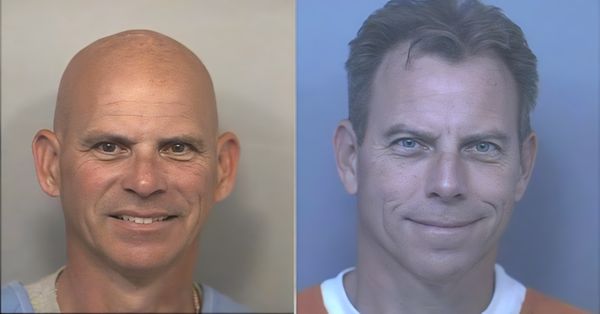LOS ANGELES — John Leguizamo had been pitching a docuseries about Latinx excellence in America for two years before MSNBC finally picked up the idea, which became the six-part show "Leguizamo Does America." The series premiered Sunday and is also streaming on Peacock.
Latinx representation matters to Leguizamo, and he says the reason the show got picked up in the first place is because in 2020 Cesar Conde was named chairman of the NBCUniversal News Group. Conde's father is an immigrant from Peru, and his mother is an immigrant from Cuba.
"A Latinx man who looks like me, who understands my culture, greenlit this show," Leguizamo, 62, says during an interview at the Sunset Marquis hotel in West Hollywood. "We pitched it to other people, but he's the one that bought it and gave us this opportunity."
"Leguizamo Does America" is part travelogue, part history lesson and part reality-show doc, packaged as fast-paced 60-minute episodes featuring Leguizamo's biting, irreverent humor and good-natured love of life and learning. As he introduces viewers to Latinx leaders in L.A.; New York; Chicago; Miami; Washington, D.C.; and Puerto Rico, it's clear he's also relishing learning more about these people and their stories.
His subjects, chosen with the help of his largely Latinx crew, include artists, writers, show runners, architects, restaurateurs, DJs, musicians, politicians and activists, alongside others making things better in their communities by simply being there. Old Cuban men playing chess in a park in Miami, for example, or the man who makes chopped cheese sandwiches at a bodega in Queens.
Leguizamo is striving to convey these people's importance to a multicultural audience that includes Latinx viewers, whom Leguizamo says often have not had the opportunity to understand their own power and influence. Latinx stories are not regularly told in American history classes, he says, and if they are, the stories often are whitewashed or otherwise made historically inaccurate.
"We don't realize that we contribute $2.8 trillion to the American GDP every year," he says, his voice rising in excitement. "If we were our own country, we'd be the fifth-largest economy in the world — bigger than England, bigger than Italy, bigger than Brazil."
Leguizamo is a self-professed "math kid" and says calculus was his "religion" in college — just the beauty of finding a concrete answer if you worked out the problem and showed the proof. He says he found solace in the simple, inarguable logic of that process, and that statistics have become a way of life for him.
He rattles them off with practiced precision — having committed them to memory to drive his central point home: America's Latino communities are incalculably valuable, influential and worthy of celebration.
In Los Angeles, Leguizamo notes that Latinx people represent nearly 50% of the city's population. At the Hollywood box office, he says, Latinos account for one-third of frequent moviegoers, boosting revenue for studios that still massively under-represent them on film.
"We're not getting our value for our money," he says.
Leguizamo has emerged as one of Hollywood's most visible champions of Latinx culture. His uncompromising call for inclusion also makes him one of the group's most fierce activists. It was not a role he envisioned for himself as a starry-eyed young acting hopeful from the Jackson Heights neighborhood of Queens.
"I was just a funny kid who was gonna be funny all his life. I was the class clown. And then I realized that things were not fair," he says. "I'm in a class at NYU — the only Latin kid — and all these white actors were going to five auditions a day, and I'm going to one every five months, and I'm going for drug dealers, murderers, killers, servants."
Leguizamo said until then he had been idealistic and believed in American meritocracy. As an A-student, paying the same tuition as his white peers, he realized that ideal was a lie when faced with cast breakdowns featuring only "white male actor, white lead actor, white romantic lead, white doctor."
He remembers thinking, "Why won't they see me? Why can't they see me?" But he knew the answer.
In 2022, at the height of his professional success, he wrote an open letter to Hollywood published in the L.A. Times.
"If white people are 59% of the American population, why do they seem to get 120% of the casting, crew and executive team?" he wrote, noting that Latinos represented a mere 2.9% of the leads in TV, movies, streaming and stage productions.
Leguizamo had already cemented his status as a wrecking ball of the dominant white cultural narrative in 2018 with his Tony-nominated one-man Broadway show, "Latin History for Morons." In that show, Leguizamo set out to unearth the untold Latinx history that his son never learned in school.
With his signature sarcasm and verve Leguizamo laid out buried facts in that show, including awful ones about how a majority of Latinx people suffered genocide — with entire languages, cultures and religions destroyed.
In "Leguizamo Does America," the actor does not shy away from the horrors of Latinx history but mostly seeks to highlight its joy, its resilience and its vibrant communities in each place he visits.
In the Los Angeles episode, Leguizamo swings by a favorite taco truck with comedian George Lopez and makes fun of himself for being afraid of how hot the salsa might be. The show is full of good-natured digs at white folks, and when Leguizamo asks what white foodies usually order at the truck, the co-owner answers, "quesadillas."
Leguizamo also has a fascinating talk with filmmaker Robert Rodriguez about how he made the groundbreaking Spanish-language indie hit "El Mariachi" in 1992, and what he has done since then to raise the profile of Latinx actors, writers and directors.
Rodriguez is notable for his success, but Leguizamo says true equality will have been achieved only when Latinx creators are so omnipresent that they are granted a very particular form of grace: "We as Latinx people need to be allowed to fail as much as white people are allowed to fail," he says. "White people are allowed 'Ishtar,' they are allowed 'Waterworld,' they're allowed 'Jack and Jill.'"
"We need to be allowed to fail too," he concludes. "That's equality, right?"
———







